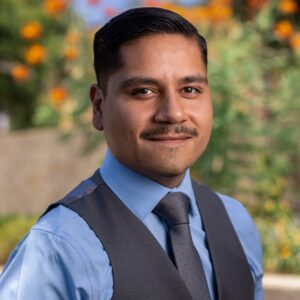Hector Chaidez Ruacho is a doctoral student at The University of Texas at Austin School of Social Work and a recipient of the Graduate School Recruitment Fellowship and Graduate School Mentoring Fellowship. He received his Psychology and Criminal Justice bachelor’s degrees at the University of Nevada Las Vegas and his Master’s of Social Work from the University at Buffalo School of Social Work (UBSSW). After completing his MSW, Hector was awarded admission to the competitive Yale School of Medicine’s two-year Post-Master’s Advanced Clinical Social Work Fellowship, where he received additional training and clinical supervision in Spanish to best serve his Spanish-speaking families. Hector obtained his clinical social work license and was trained in various evidence-based practices, including trauma-specific and family-based interventions. After completing his fellowship, Hector accepted a position as a Clinical Instructor of Social Work, where he continued providing psychotherapy to children, youth, and their families at the Yale Child Study Center’s community mental health clinic. Hector’s research interests include understanding mental health access and utilization among the Latine population and Spanish speakers, as well as creating interventions and culturally adapting interventions explicitly for Immigrant, Latine, and Spanish-speaking families, which draws from Latine healing practices just as much as from the mental health literature.
Hector has developed expertise in using Latine healing practices such as proverbs, more commonly known in Spanish as “dichos,” with Spanish-speaking families through a cultural humility lens. He has been selected to present on this at several conferences and spaces, including the Yale Child Study Center’s Grand Rounds, the Austen-Riggs – Yale Conference, the National Latinx Social Work Conference, and more. Being a past awardee of the NASW Award from UBSSW and the NASW Western Division, Hector understands this as a way to embody his profession’s code of ethics by holding his institutions and the broader mental health field accountable to stay true to social work values.
Being an Immigrant himself and coming from a multigenerational migrant farm worker family, Hector recognizes that, much like farming, the movement to create a better mental health system cannot be done by a single individual. He believes there is a need for the right tools and a community willing to work together. Additionally, Hector understands that it is his turn to plant seeds in systems for future generations to benefit, just as he has benefitted from the fruits previous generations laid. His future professional goals include securing an academic position where he can contribute to cultivating the next generations of social workers, particularly Spanish-speaking clinicians. Hector understands that our seeds moving forward must be strong enough that their roots can eventually break the concrete foundations of systems that continue to be inequitable.


